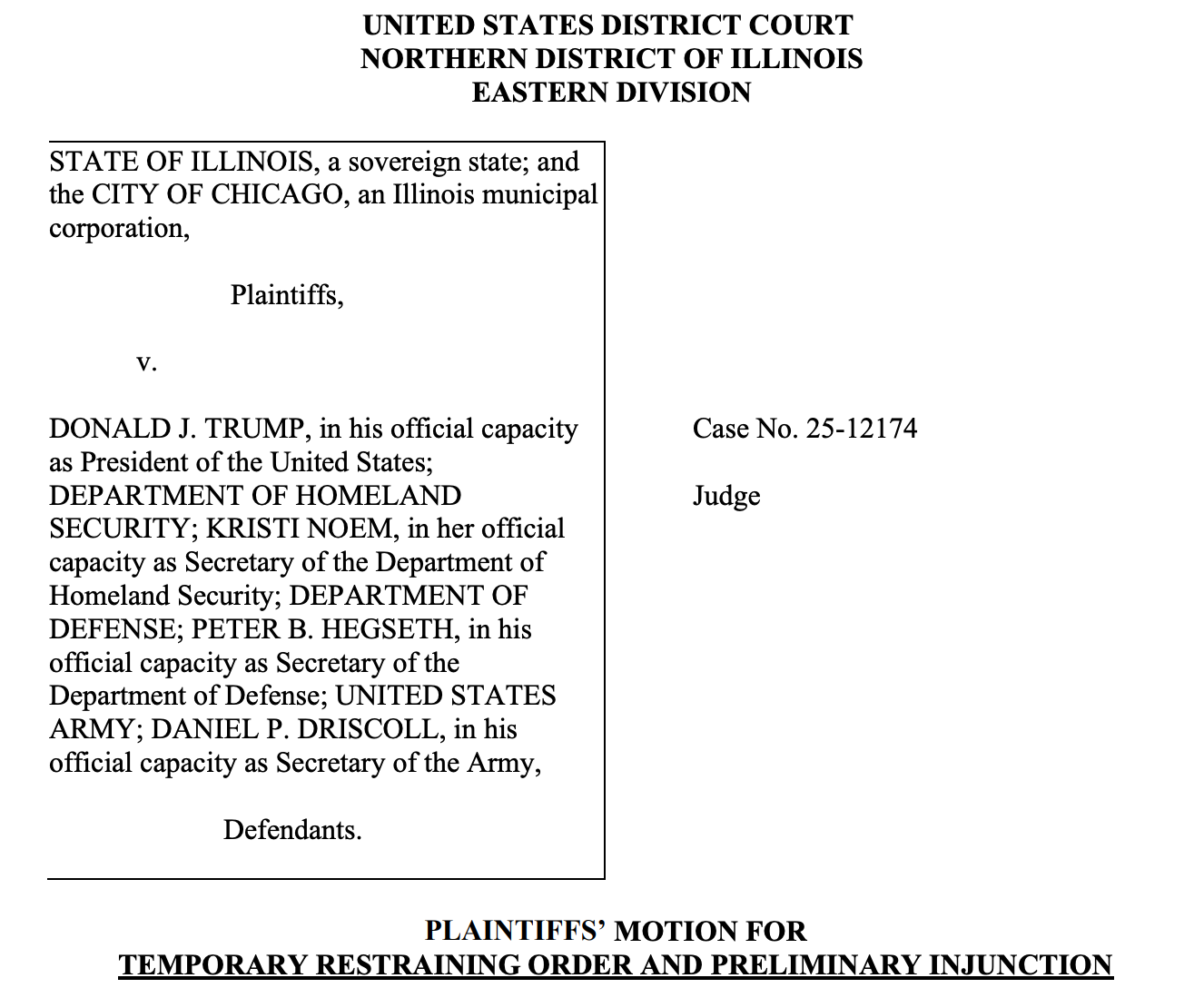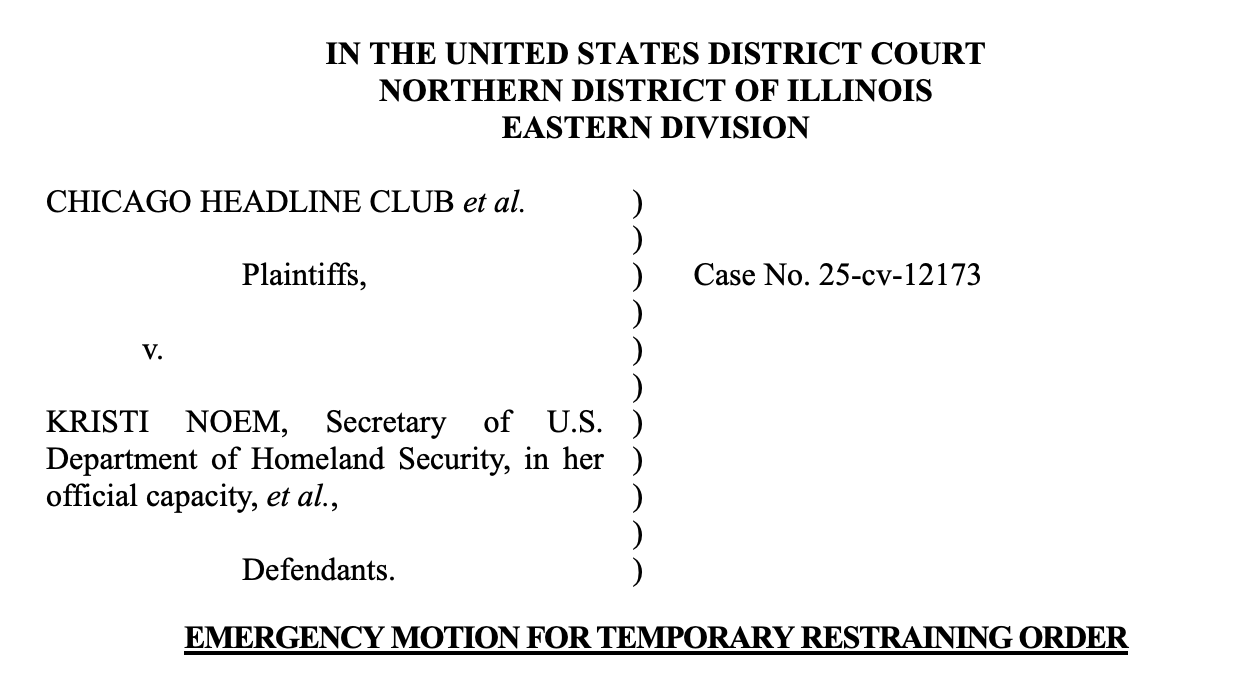Pair of lawsuits challenging Trump's targeting of Chicago get first hearings
The lawsuits challenge the Trump administration's military deployment efforts and harsh treatment of protesters and journalists. More hearings are set for later this week.
On Monday, a pair of lawsuits were filed in Illinois challenging two divergent aspects of Trump administration’s immigration enforcement policies that have already been blocked elsewhere — military deployment efforts and harsh treatment of protesters and journalists.
In both cases, federal judges held hearings on Monday and neither reached a conclusion on the initial temporary restraining orders being sought by the respective plaintiffs. The judge hearing the protesters and journalists’ case, however, held an extensive hearing and sided with the challengers in several preliminary rulings and a TRO is expected before this weekend in the case.
In both cases, follow-up hearings are already set for later this week.
Each case is similar to litigation that has played out in recent months on the West Coast — as President Donald Trump targeted Los Angeles this June with his initial troop deployment and then announced National Guard being activated to be sent to Portland, Oregon, in late September.
After word spread Sunday that Defense Secretary Pete Hegseth called up the Texas National Guard to deploy them in other states, including at least to Portland and Chicago, Illinois and Chicago sued first thing Monday morning over the threatened military deployment.
Referencing activation of the Illinois National Guard on October 4 and Texas National Guard on October 5, the lawsuit stated, “These advances in President Trump’s long-declared ‘War’ on Chicago and Illinois are unlawful and dangerous. The Court should enjoin the Federalization Order, Texas Mobilization Order, and any subsequent effort to achieve the same end with the National Guard of the United States or other U.S. military, immediately and permanently.”
As noted above, they also filed a motion for the federal court to issue a TRO blocking the effort — similar to that granted this weekend (twice) in Oregon.
Also Monday, people who have participated in protests outside the Broadview ICE facility, located just outside of Chicago, and journalists who have covered the protests filed their own lawsuit, alleging violations of First Amendment and Fourth Amendment rights.
“Plaintiffs endeavor to protect their basic constitutional rights to express their views opposing the lawlessness unleashed on the Chicagoland area, and to safely report on that public outcry, without fear of again being shot, gassed, and beaten by federal agents,“ the lawsuit argued.
They, too, filed a motion for a TRO, seeking a list of restrictions on the government’s treatment of covered protesters and of the journalists covering the story — similar to that granted by way of a preliminary injunction in September in California. (That preliminary injunction has been appealed to the U.S. Court of Appeals for the Ninth Circuit.)
U.S. District Judge April Perry, a Biden appointee, was assigned the Illinois v. Trump case and quickly scheduled a hearing for 2 p.m. CT. Although there was no remote-access for journalists, Jon Seidel at the Chicago Sun-Times live-posted and later brought us this report (along with Tina Sfondeles) of the brief hearing:
Perry acknowledged she was “very troubled by the lack of answers” Monday from a Trump administration lawyer about the deployment, including where in northern Illinois the troops might appear.
But she also said more than 500 pages of filings had suddenly arrived in the form of a lawsuit from Illinois and Chicago against the Trump administration, so she gave the Justice Department until midnight Wednesday to respond.
The next hearing in the case is set for 11:00 a.m. Thursday.
As Seidel noted, Perry ended Monday’s hearing with a warning to the Trump administration: “If I were the government, I might strongly consider taking a pause on this until Thursday, so that we are not in a position where we are doing a full-fledged hearing with whatever has happened.“
Elsewhere in the federal courthouse in Chicago on Monday, U.S. District Judge Sara Ellis, an Obama appointee, was assigned Chicago Headline Club v. Noem over the treatment of protesters and journalists.
Ellis quickly scheduled a hearing for 2:30 p.m. CT. Her hearing lasted nearly four hours, however, and included remote access (so I live-posted throughout). Throughout the hearing, Ellis made clear her initial rulings that the plaintiffs showed both that they likely have standing to bring the claims and are likely to succeed on both the First and Fourth Amendment claims. Ellis also made clear that she questioned several of the government lawyer’s claims and arguments.
When Sean Skedzielewski, Counsel to the Assistant Attorney General for the Civil Division, began arguing that doxxing of ICE agents was of such a concern that their anonymity was necessary, Ellis proceeded to give one of her longest responses in the hearing.
Noting that judges often face doxxing and addressing the threats they receive — which have ranged from pizza deliveries, intended as an “I know where you live” threat, to watching a family member be killed, a reference to the killing of U.S. District Judge Esther Salas’s son — Ellis said the public status is a part of government service. Acknowledging how horrible it is — referencing the depths to which society has sunk that this happens — she nonetheless said, “[T]hat doesn’t mean that you then get to do this job and be anonymous. ... Under the rule of law, it is important to be transparent.”
Later in the hearing, when fastidiously going line by line through the plaintiffs’ proposed TRO — and listening to DOJ’s objection to nearly every sentence — Ellis raised the issue again when they got to that portion of the proposed TRO.
“Transparency and faith in the rule of law” are at issue here, Ellis said, noting that her having to put her name on opinions keeps her “from going off the rails, because I have to do it publicly.”
The same conception of accountability applies to those government officials accused of violating people’s rights in protesting ICE or covering those protests, she said, adding, “Here, I think it is important that these officers and agents, at some point along the way, could be identified.”
Seeking a middle ground, Ellis asked Skedzielewski whether ICE agents — or Homeland Security agents interacting with the public more broadly — have or could have “some visible identification” like a badge number or agent number that would help provide a means of accountability for the public. When Skedzielewski said he didn’t know, Ellis told him to consult with his client on that.
Although early on in the hearing it appeared that Ellis was ready to grant a TRO on Monday, ultimately she erred on the side — she said — of ensuring the best possible order they could craft, giving Skedzielewski time to contact DHS about a handful of questions, including the identification issue, and the parties time to confer.
She set the next hearing for 2 p.m. CT Wednesday.
Ellis, also, ended Monday’s hearing with a warning: “At this point, DHS is on notice.”
Over the coming days — as to both cases — we will see the value of those warnings without orders. If the past nine months serve as a guide, however, this could be a very complicated, difficult week in Chicago.





Somehow, this gives me hope. I continue to resist. I am hopeful that the judiciary hold fast to their oaths to the constitution.
Thank you, Chris, for your post. It is much appreciated. The district and state courts are the last bastion protecting the rule of law. Judge Ellis got it exactly right: “Transparency and faith in the rule of law” are critical to protecting the rights under our Constitution.